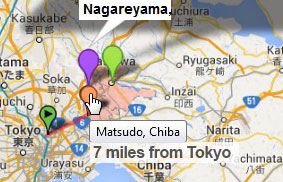http://www.asyura2.com/14/genpatu40/msg/312.html
| Tweet |

Japan Gov’t: Tokyo area hit with ‘unnoticed’ wave of Fukushima radioactive material — Newspapers: “Heavily contaminated… High-concentration radiation” — Prime Minister: “We were right on the verge” of evacuating 50 million people (AUDIO)
日本政府:東京エリアは福島放射性物質の「見過ごされた」波に見舞われた−新聞:「高濃度の放射能(によって)...重度に汚染された」−首相:5000万人避難の「我々は正に寸前であった」(音声)
Published: September 8th, 2014 at 8:21 am ET By ENENews
公開:2014年9月8日、午前8:21 ET ENENewsによる
Mainichi Daily News, Sept. 5, 2014 (emphasis added): Radioactive plumes spread cesium a week after Fukushima disaster — A second wave of radioactive material from the Fukushima No. 1 Nuclear Power Plant disaster spread over the Tohoku and Kanto regions… analysis of radiation readings [by the Nuclear Regulation Authority and the Ministry of Environment] has found…. It was already known… “radioactive plumes” had spread on March 15 and 16., but {there were] similar radiation readings for March 20 and 21…
毎日新聞、9月5日、2014年(強調は記者):放射性プルームは福島災害後一週間でセシウムを撒き散らした−福島第一原子力発電所災害からの放射性物質の第二波は、東北•関東地方に撒き散らされた... [原子力規制庁及び環境省による]放射能測定の分析が見つかりました...。これは既に知られていた... 「放射性プルーム」は3月15日と16日に広がっていた、しかし3月20日および21日に、類似した放射能の測定値{がありました]...
Ministry of the Environment used data from constant monitoring devices used to measure… air pollution [with] filter paper that catches airborne particles… Rain did not fall on March 20 and 21… thought to be the reason why the second radioactive plume was not noticed until now. In the Kanto region, two belts of high-concentration radiation were registered — one on March 15 and one on March 21.
環境省は、測定に慣れた一定のモニタリング装置からのデータを使用した...空気伝達粒子を捕捉するペーパーフィルター[を用いた] ... 雨は3月20日と21日に降らなかったことが...何二次放射性プルームが、今まで気づかれななかった理由であると考えられた−関東地方では、高濃度放射能による2本の帯が3月21日に一つと3月15日に1つ記録されました。
Yuichi Moriguchi, environmental systems professor at the University of Tokyo: “This is important data that shows when and where high concentrations of cesium in the atmosphere spread. This information will help in accurately determining residents’ radiation exposure.”
東京大学環境システム学、森口祐一教授:「これはセシウム高集積が大気中に何時、何処に広がったかを示している重要なデータである。この情報は、住民の放射線被曝(量)を正確に決定する際に役立ちます。」
Measurements reported in Mainichi article
毎日新聞の記事で報道された測定値
3 p.m. on March 20, the Fukushima city monitoring station registered a reading of 104.1 becquerels per cubic meter of air… this level continued until the next morning [More than double the highest level from March 15 of 45.5 Bq/m3]
午後3時3月20日、福島市のモニタリングステーションは空気1立方メートル当たり104.1ベクレルの測定値を記録した...このレベルは翌朝まで続いた[3月15日の最高レベル45.5ベクレル/㎥の2倍以上であった]
March 21 there was a spike in radioactive cesium concentrations [around] the northeastern coast of Tokyo Bay… and created radioactive “hot spots”
3月21日、東京湾の北東沿岸[周囲]に放射性セシウム集積のスパイクがあった...そして放射性「ホットスポット」を形成した
Brisbane Times, Aug 28, 2014: Former Japanese Prime Minister Naoto Kan… considered evacuating… Tokyo, which has 50 million people. “We were right on the verge,” Mr Kan said.
(オーストラリア)ブリスベン・タイムズ、2014年8月28日:元日本首相・菅直人... 避難を検討した... 50万人の人々が住む東京からの。 「我々は正にその寸前であった、」菅氏は語った
Japan Times, Sept 1, 2014: Three cities… heavily contaminated with radioactive materials [from] Fukushima No. 1 plant [may] build facilities to store incinerated radioactive waste… the cities of Kashiwa, Matsudo and Nagareyama [only a few miles from downtown Tokyo]… produced a total of 526 tons of such waste, according to NHK… the prefectural government is also asking the three cities to… dispose of it on their own, if the central government fails to build a disposal facility by next March.
ジャパンタイムズ、2014年9月1日:3つの都市は...福島第一原発[からの]放射性物質で重度に汚染されたが、放射性廃棄物を保管するための施設を建設する[かもしれない] ... 柏市、松戸市、流山市で[東京から僅か数マイルのダウンタウンである]が... NHKによると、そのような廃棄物を合計526トン産出した...。 [の都市焼却 [も]東京] ...県行政はまた、もし中央政府が次の3月までに処理施設を建設し損ねた場合、市自身でそれを処分するように3つの都市に求めている。

David Lochbaum, nuclear expert at Union of Concerned Scientists, Sept 2, 2014 (at 28:30 in): Some of the US naval bases in Japan that were even further away than Tokyo registered higher readings than closer facilities… hot spots were in some cases further away than Tokyo, and in Fukushima’s immediate surroundings… radiation doesn’t follow straight line and stop after a certain distance. >> Full interview here
ダビッド・ロッホバーム、憂慮する科学者同盟の原子力専門家、2014年9月2日(28分30秒の所で):さらに東京から離れた在日米海軍基地の幾つかは、(原発)施設近くよりも高い測定値を記録している...ホットスポットは幾つかのケースでは東京よりさらに離れている、そして福島のすぐ近くにある...放射能は直線に従わない、そして、一定の距離の後に停止しません。>>ここに完全インタビュー
See also: Nuclear fuel from Fukushima deposited near Tokyo suburbs — ‘Glassy’ uranium spheres detected over 170 km from plant — Reactor structural material also found (PHOTOS)
参照:福島からの核燃料は、東京郊外の近くに堆積した−「ガラス状」ウラン球体が原発から170キロメートル以上で検出された−原子炉構造素材も見つかった(写真)
▲上へ ★阿修羅♪ > 原発・フッ素40掲示板 次へ 前へ
 スパムメールの中から見つけ出すためにメールのタイトルには必ず「阿修羅さんへ」と記述してください。
スパムメールの中から見つけ出すためにメールのタイトルには必ず「阿修羅さんへ」と記述してください。すべてのページの引用、転載、リンクを許可します。確認メールは不要です。引用元リンクを表示してください。